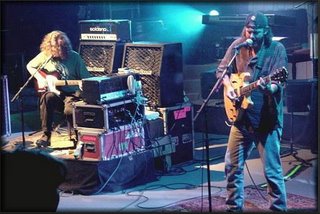Widespread Panic receives cooler reception in Northeast
By: Mike Meyer
Issue date: 11/13/01
11/08/01 Orpheum Theater, Boston, MA

1: Pigeons, Bear's Gone Fishin', Sleepy Monkey, Tall Boy, Driving Song > Casa Del Grillo > Driving Song, Maggot Brain, Big Wooly Mammoth, Knocking 'Round The Zoo
2: All Time Low, Blight, Climb To Safety, Let's Get The Show On The Road, Happy Child > Ain't Life Grand, Chilly Water > Drums > Chilly Water, Blue Indian, Red Beans
E: This Part Of Town, Makes Sense To Me
['Symptom Of The Universe' tease by Mike before 'All Time Low'; 'Symptom Of The Universe' tease by Dave after 'Drums'; 'Third Stone From The Sun' jam after 'Drums']
Widespread Panic originally booked their November 8 show at the Tsongas Arena, but had to switch to the Orpheum at the last minute. The Athens, GA-based band was having trouble selling tickets for the Lowell venue, because of their small following in the Northeast.
Widespread Panic is a cultural staple in the South, however. In 1998 they filled the streets of Athens with more than 80,000 people for an album release party and concert. The band has been around since 1997 and has released seven studio albums and two live CDs.
Inherently, Widespread Panic is not known for their album sales or studio releases; they have achieved their devout fan base through constant touring for the last 14 years, and by changing up their jam-intensive shows every night. Their Orpheum show was a great example of what Widespread Panic is all about.
The band came on stage at around 7:30 p.m., opening their set with two crowd favorites, "Pigeons" and "Tallboy." As the first set continued, the band segued between songs with ease and guitarist Mike Houser seemed to take control of every jam.
"Driving Song" was next, followed by lead singer and guitarist John Bell's Spanish singing debut from their newest album Don't Tell The Band on "Casa Del Grillos."
The set came to a peak with another song from the new album "Big Woolly Mammoth," sang by pianist and organ player John Hermann, in which the crowd followed the tradition of throwing lighters at the stage during the song.
After a break the band came on for their second set. It started off with another crowd pleaser, "All-Time Low," and then "Climb To Safety." This song seemed to summarize the Widespread Panic experience as the entire crowd sang along to the chorus.
The balcony seemed like it was on the verge of collapse during a fast-paced, piano driven ode to Southern gourmet called "Red Bean's Cooking." Next, the 20-minute-plus drum solo and bass solo by drummer Todd Nance, percussionist Sonny and bassist Dave Schools purged any doubt about the band's musical ability. The band came on for an encore, which seemed to be a dedication to injustice with "This Part of Town" and "Makes Sense To Me."
Widespread Panic has been placed in the category of Phish and String Cheese Incident as a "jam band" in the tradition of the Grateful Dead. There are many of the similarities to the aforementioned bands, including long instrumentals and a neo-hippie following reminiscent of the Deadheads. That is where the comparison ends. Widespread Panic is a Southern rock band with closer ties to the Allman Brothers Band and the Marshall Tucker Band than the Dead.
Widespread Panic may not be a familiar name to as many in the Northeast as it is in the South, but anyone who caught the show on Thursday night will surely remember the band next time they roll through Boston.
--------------------------------------------------
--------------------------------------------------





